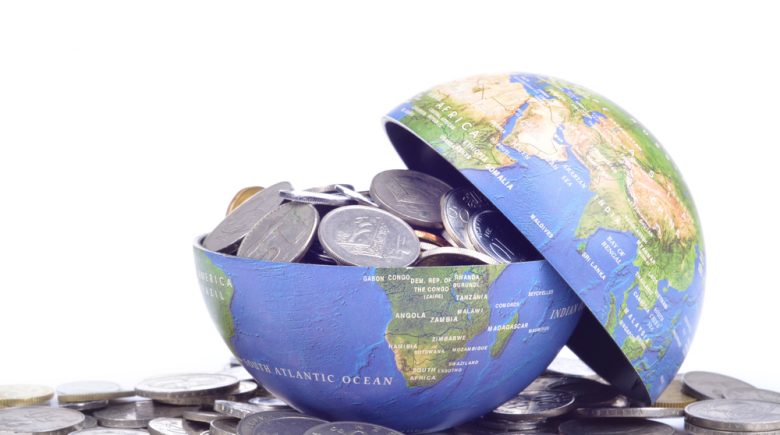Imports, Exports, Tariffs, and GDP
Countries rely on trade, imports and exports, to bolster their nations income as well as supply their citizens with goods and services that would not normally be available to them. These goods and services have a monetary value that can be calculated into what is known as the GDP or Gross Domestic Product.
Imports are what a country or industry brings into itself from outside sources. Goods, resources, and services can all be imported if there is a need for them. Imports however will detract from an industries profits because suppliers and transporters will also need to be paid for their time and effort.
Exports are what a country or industry sends out of itself such as their products or services going to market for sale. Exports are normally the aspect of business that will generate income for an industry, so it is an important factor for success in any economy.
Tariffs are taxes placed on imports and exports by governments. Governments want to make money on goods and services entering or leaving their country to maintain infrastructure and fund their own needs. If tariffs are not paid the government may reject the import or export of goods and services at customs or via other means.
A high GDP usually indicates a strong economy, high manufacturing capabilities, as well as a broad range of services such as medical care, cleaning services, entertainment, and transportation amongst many others. However, in the case where goods and services do not receive a monetary backing or payment the economy would still not be strong which is not unheard of across the globe.
In these countries where there is no payment to industry there is usually a large inflation in their monetary value to compensate for lack of funds. When an inflation of currency occurs the price of goods and services tend to skyrocket while the money that is in circulation tends to drop creating a cascading effect which eventually leads to a full on economic collapse in which case the government and citizens have to fend for themselves for survival even if there are available goods and services. Even though these effects can be reversed it is a long and tedious task, sometimes near impossible for some countries.
Supply and Demand
The law of supply and demand is perhaps one of the biggest factors to economic success even on the world economy. Demand of consumers can only be met when there is a supply, and industries can only remain successful when there is a need for their goods and services. Consumers will not pay for goods and services that they do not require.
Resources and other Factors of Economic Success
Every country is looking to join the modern world, some are just not capable for various reasons: lack of income, education, population, or means to produce goods. This inability then creates a stagnation in their local industries.
Not every country has the same resources or capabilities as other countries, which has created a necessity for global cooperation to supply more people with their daily necessities as well as luxury items. Globalization is rapidly increasing the pace at which goods and services can be sent around the world and should only be expected to quicken going into the future.
Most countries that are considered third world or budding nations are looking to the more experienced nations to help lead them into the future. Countries that have not reached to a certain level of autonomy are almost completely reliant on the goods, services, and resources other nations can provide them.
All businesses need capital to continue running, workers need to get paid as well as taxes, rent or mortgage. If an industry is reliant on another industry for product or services, they will also need capital to pay these other industries. Income is necessary for every business or it will not be able to sustain itself.
Lack of education can also create a serious problem in industry. When critical skills are needed for the operation of machinery, accounting, product creation, and maintenance an uneducated population will not be able to handle these responsibilities.
In places where there is low population there may not be the manpower to sustain major industry. People are the backbone of any industry and an industry that requires lots of workers can only be located where there is a population fit to meet this demand.
Resources are another integral part of any industry, the creation of products relies on various resources in order to maintain their production. When the proper resources can not be found, they must either change locations or import the necessary resources to begin or continue production.
However, now, with the creation of the internet and faster more reliable transportation it is easier than ever for small businesses and industries to reach the global market. In today’s world goods and service providers are easily capable of searching for where their industry is needed.
Though advanced economics can tend to get somewhat confusing, understanding some of these basic principles should make it easier to comprehend for anyone. We all rely on the economy to survive, so by education and experience the standard of living can be raised across the globe as nations realize their niche in the world economy.
Imports, Exports, Tariffs, and GDP
Countries rely on trade, imports and exports, to bolster their nations income as well as supply their citizens with goods and services that would not normally be available to them. These goods and services have a monetary value that can be calculated into what is known as the GDP or Gross Domestic Product.
Imports are what a country or industry brings into itself from outside sources. Goods, resources, and services can all be imported if there is a need for them. Imports however will detract from an industries profits because suppliers and transporters will also need to be paid for their time and effort.
Exports are what a country or industry sends out of itself such as their products or services going to market for sale. Exports are normally the aspect of business that will generate income for an industry, so it is an important factor for success in any economy.
Tariffs are taxes placed on imports and exports by governments. Governments want to make money on goods and services entering or leaving their country to maintain infrastructure and fund their own needs. If tariffs are not paid the government may reject the import or export of goods and services at customs or via other means.
A high GDP usually indicates a strong economy, high manufacturing capabilities, as well as a broad range of services such as medical care, cleaning services, entertainment, and transportation amongst many others. However, in the case where goods and services do not receive a monetary backing or payment the economy would still not be strong which is not unheard of across the globe.
In these countries where there is no payment to industry there is usually a large inflation in their monetary value to compensate for lack of funds. When an inflation of currency occurs the price of goods and services tend to skyrocket while the money that is in circulation tends to drop creating a cascading effect which eventually leads to a full on economic collapse in which case the government and citizens have to fend for themselves for survival even if there are available goods and services. Even though these effects can be reversed it is a long and tedious task, sometimes near impossible for some countries.
Supply and Demand
The law of supply and demand is perhaps one of the biggest factors to economic success even on the world economy. Demand of consumers can only be met when there is a supply, and industries can only remain successful when there is a need for their goods and services. Consumers will not pay for goods and services that they do not require.
Resources and other Factors of Economic Success
Every country is looking to join the modern world, some are just not capable for various reasons: lack of income, education, population, or means to produce goods. This inability then creates a stagnation in their local industries.
Not every country has the same resources or capabilities as other countries, which has created a necessity for global cooperation to supply more people with their daily necessities as well as luxury items. Globalization is rapidly increasing the pace at which goods and services can be sent around the world and should only be expected to quicken going into the future.
Most countries that are considered third world or budding nations are looking to the more experienced nations to help lead them into the future. Countries that have not reached to a certain level of autonomy are almost completely reliant on the goods, services, and resources other nations can provide them.
All businesses need capital to continue running, workers need to get paid as well as taxes, rent or mortgage. If an industry is reliant on another industry for product or services, they will also need capital to pay these other industries. Income is necessary for every business or it will not be able to sustain itself.
Lack of education can also create a serious problem in industry. When critical skills are needed for the operation of machinery, accounting, product creation, and maintenance an uneducated population will not be able to handle these responsibilities.
In places where there is low population there may not be the manpower to sustain major industry. People are the backbone of any industry and an industry that requires lots of workers can only be located where there is a population fit to meet this demand.
Resources are another integral part of any industry, the creation of products relies on various resources in order to maintain their production. When the proper resources can not be found, they must either change locations or import the necessary resources to begin or continue production.
However, now, with the creation of the internet and faster more reliable transportation it is easier than ever for small businesses and industries to reach the global market. In today’s world goods and service providers are easily capable of searching for where their industry is needed.
Though advanced economics can tend to get somewhat confusing, understanding some of these basic principles should make it easier to comprehend for anyone. We all rely on the economy to survive, so by education and experience the standard of living can be raised across the globe as nations realize their niche in the world economy.




